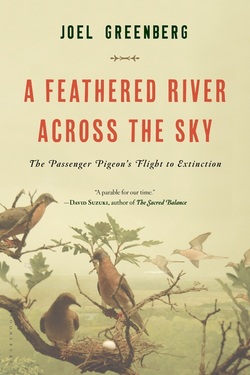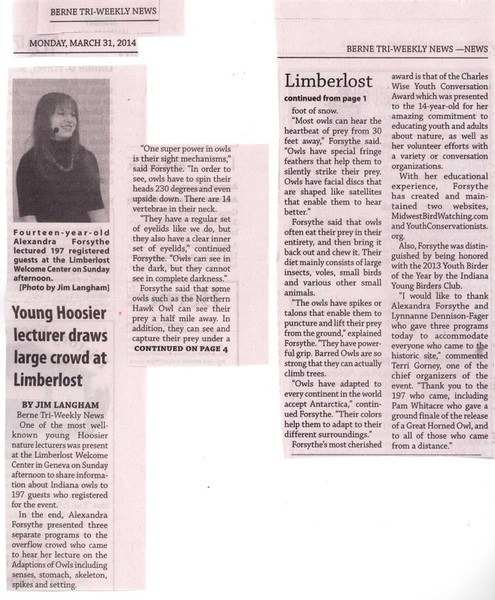
I have had the pleasure of reading Joel Greenberg’s book, “A Feathered River Across the Sky”, and I’ll have the privilege of listening to him speak this Saturday at the Indiana Audubon Society’s Spring Festival. This book should be required reading, not just for birders but for everyone, especially young people whose actions and decisions will have an enormous impact on the planet for decades to come.
First, I must be honest. Reading the book was not entirely pleasurable. I spent a great deal of time either with my fists clenched in anger or wiping back tears, not because of the quality of the writing (which is outstanding), but because of the horrible behavior demonstrated by the people in the book. While people may not be decimating the populations of plants and animals in the same way as they did the Passenger Pigeon, we are doing so in new, more modern ways.
The Passenger Pigeon once numbered in the billions and constituted up to 40% of the continent’s birds. They were hunted relentlessly. Gene Stratton-Porter’s father abhorred the practice of shooting the pigeons and prophetically warned that if the massive killing of the birds did not stop, they may disappear. However, since they were so plentiful, Gene articulated the sentiment of the public, “that such a thing could happen in our own day as that the last of these beautiful birds might be exterminated, no one seriously dreamed”. And yet that is exactly what happened. The last Passenger Pigeon died 100 years ago. In 1860, more than a billion birds remained. In just 54 years, they were all gone.
Mr. Greenberg’s book serves to tell the tale of the Passenger Pigeon and to warn us that our actions can have catastrophic effects, not just on one species, but on every species with which that species interacts. The demise of the Passenger Pigeon, sadly, is not an isolated incident. Such losses continue today. The numbers of species threatened with extinction in Mr. Greenberg’s book are startling!
There is much that can be done. I think we need to start by developing a love of nature in young people. Bird watching, I believe, is one of the gateways to becoming a nature lover. It’s easy, it can be done anywhere and inexpensively, and it can appeal to everyone from someone who likes cute, tiny things like hummingbirds to someone who prefers lethal hunters like the Northern Goshawk. Only if you develop an appreciation of the natural world will you want to take steps to preserve it. But how do you turn young people into birders when it’s more “cool” to get a high score on the XBox? I’m working with Limberlost State Historic Site to develop a series of outreach programs designed for students. We discuss the impressive adaptations (which are far more “cool” than the animated creatures on the XBox), we explore the many ways in which birds help us, and we talk about ways that we can return the favor and help the birds. If the young children who attend the programs realize how interesting birds are, perhaps that love of nature will grow throughout their lives and they will be willing to act on behalf of those who cannot speak for themselves.
The loss of any species due to human action is inexcusable. I am grateful to Mr. Greenberg for writing this book and for doing so much to help raise awareness.
First, I must be honest. Reading the book was not entirely pleasurable. I spent a great deal of time either with my fists clenched in anger or wiping back tears, not because of the quality of the writing (which is outstanding), but because of the horrible behavior demonstrated by the people in the book. While people may not be decimating the populations of plants and animals in the same way as they did the Passenger Pigeon, we are doing so in new, more modern ways.
The Passenger Pigeon once numbered in the billions and constituted up to 40% of the continent’s birds. They were hunted relentlessly. Gene Stratton-Porter’s father abhorred the practice of shooting the pigeons and prophetically warned that if the massive killing of the birds did not stop, they may disappear. However, since they were so plentiful, Gene articulated the sentiment of the public, “that such a thing could happen in our own day as that the last of these beautiful birds might be exterminated, no one seriously dreamed”. And yet that is exactly what happened. The last Passenger Pigeon died 100 years ago. In 1860, more than a billion birds remained. In just 54 years, they were all gone.
Mr. Greenberg’s book serves to tell the tale of the Passenger Pigeon and to warn us that our actions can have catastrophic effects, not just on one species, but on every species with which that species interacts. The demise of the Passenger Pigeon, sadly, is not an isolated incident. Such losses continue today. The numbers of species threatened with extinction in Mr. Greenberg’s book are startling!
There is much that can be done. I think we need to start by developing a love of nature in young people. Bird watching, I believe, is one of the gateways to becoming a nature lover. It’s easy, it can be done anywhere and inexpensively, and it can appeal to everyone from someone who likes cute, tiny things like hummingbirds to someone who prefers lethal hunters like the Northern Goshawk. Only if you develop an appreciation of the natural world will you want to take steps to preserve it. But how do you turn young people into birders when it’s more “cool” to get a high score on the XBox? I’m working with Limberlost State Historic Site to develop a series of outreach programs designed for students. We discuss the impressive adaptations (which are far more “cool” than the animated creatures on the XBox), we explore the many ways in which birds help us, and we talk about ways that we can return the favor and help the birds. If the young children who attend the programs realize how interesting birds are, perhaps that love of nature will grow throughout their lives and they will be willing to act on behalf of those who cannot speak for themselves.
The loss of any species due to human action is inexcusable. I am grateful to Mr. Greenberg for writing this book and for doing so much to help raise awareness.

 RSS Feed
RSS Feed
